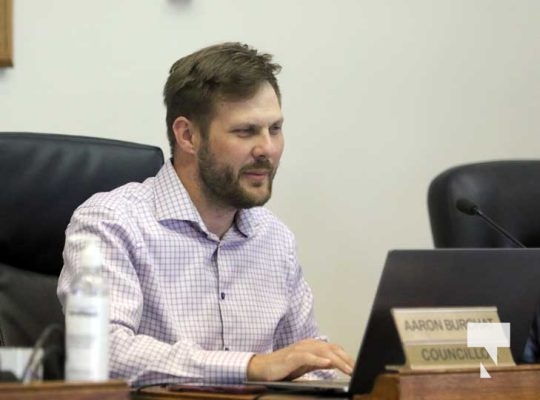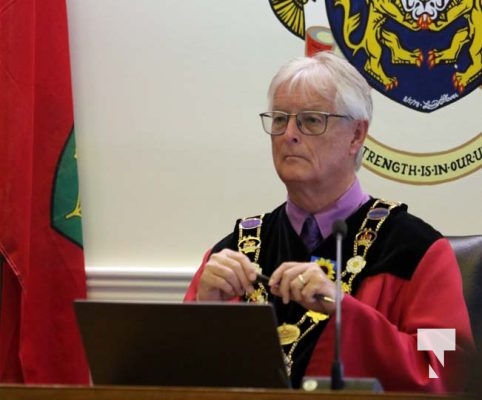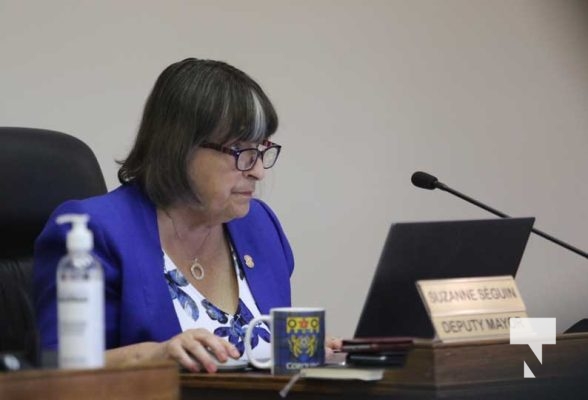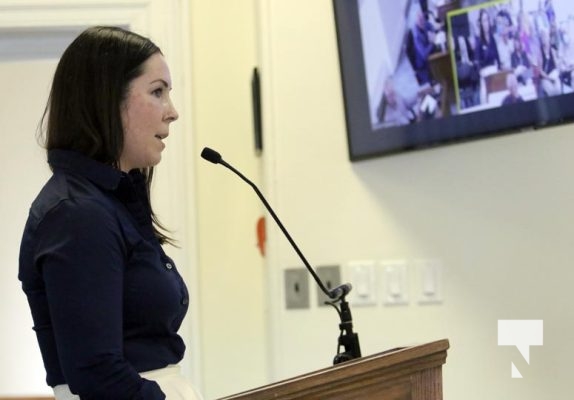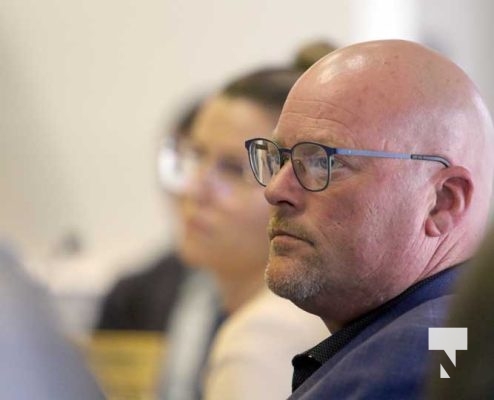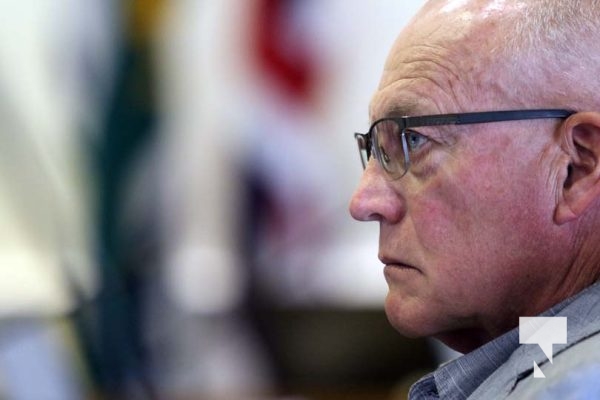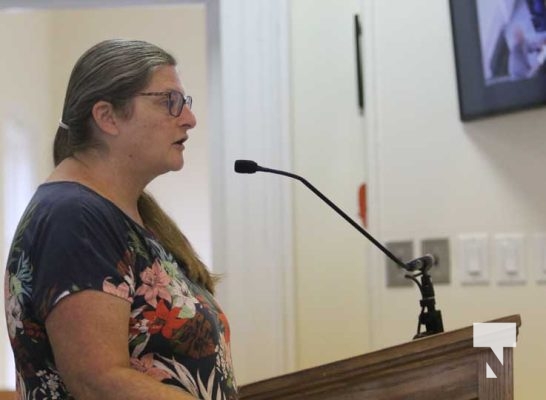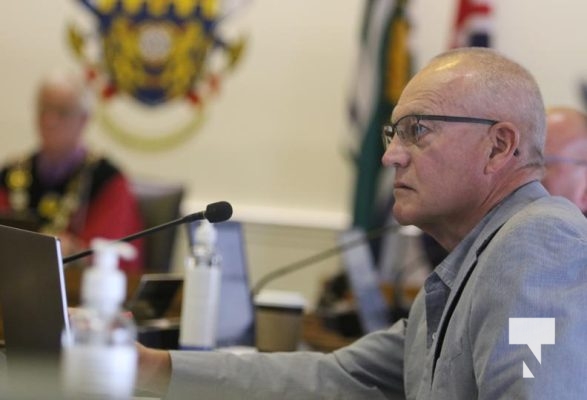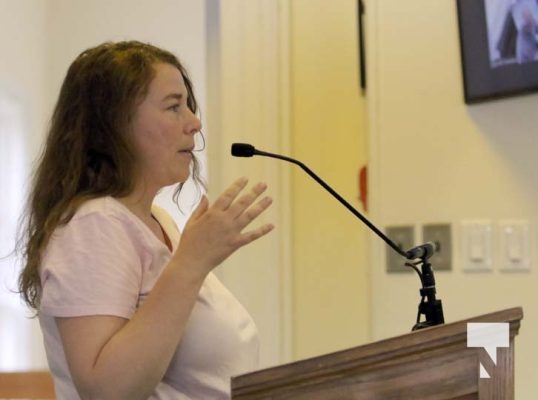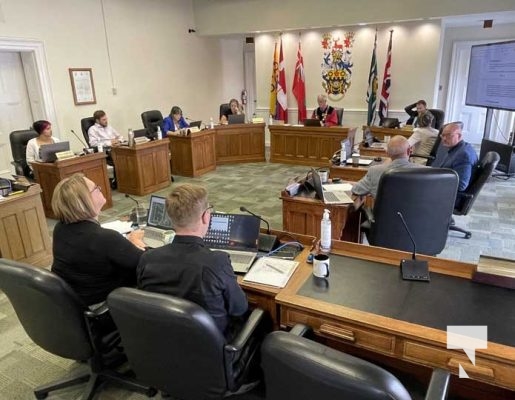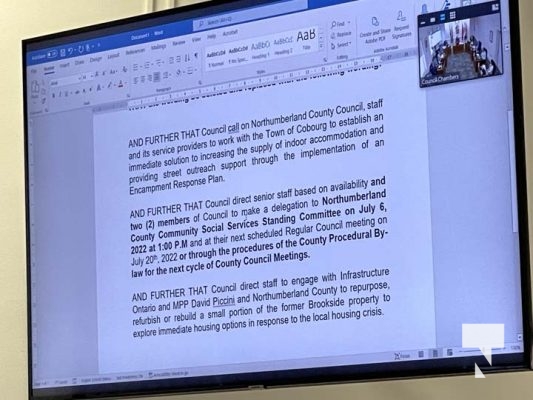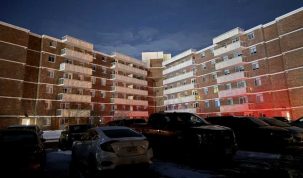By Cecilia Nasmith/Today’s Northumberland
At a special session Monday, Cobourg council voted not to suspend enforcement of applicable bylaws in order to allow homeless individuals to sleep rough in unmaintained areas of municipal parks.
The vote followed two hours of presentations from members of the community on the issue that – while painting a vivid and eye-opening picture of homelessness in the community – for the most part expressed at best tepid support for permitting such sheltering as it was a stopgap solution to a chronic problem.
An exhaustive 24-page staff report, prepared within a single week that included a statutory holiday, estimated as-yet-unbudgeted municipal costs of allowing sheltering at $134,500. In a letter to council, Cobourg Police Service estimated that additional staffing costs for this purpose – also not originally budgeted for – could be an additional $102,000 to $140,000. Municipal Clerk Brent Larmer addressed liability issues the town would assume should encampments be permitted, and Fire Chief Ellard Beaven spotlighted safety issues from the propane and other appliances that would likely be used for warmth and cooking.
The motion passed unanimously called for maintaining the status quo as far as enforcement of municipal bylaws currently in place.
It also called on council to endorse a revised Encampment Response Plan by the bylaw department for co-ordination with the County of Northumberland’s Homelessness Co-ordinated Response Team in establishing “a co-ordinated systemic multi-agency response to those sleeping rough in the Town of Cobourg to facilitate person-centred engagement opportunities and individualized connections to community-based supports, including dignified housing/shelter options.”
And in the event of an encampment site being cleared out, any personal belongings recovered are to be held two weeks, and notification provided for pick-up.
The motion also calls for Chief Administrative Officer Tracey Vaughan to deliver an oral report to council on homelessness in the Town of Cobourg as a standing item under General Government Services at future meetings.
Ten delegations had signed up to be heard, and council chambers (newly reopened to members of the public) had an overflow crowd whose excess members had to be accommodated on the first floor in the Old Bailey Courtroom.
Mayor John Henderson also took a moment to announce that a video published by a group called Ontario Proud was erroneous in its claim that council had approved a motion to allow homeless encampments at its June 30 meeting. In fact, Henderson said, the evening’s meeting to further examine the issue is what the June 30 motion called for.
Michael Brown led off the delegations, saying he came to town in 2018, worked and paid his taxes, and then struggled with addiction issues, recovery issues and eviction issues. Citing 2021 data that Cobourg’s vacancy rate was 0.8% and the average rent on a one-bedroom apartment was $1,224, he declared living in Northumberland County unaffordable. Still, because his son lives here, so must he.
“Camping is not a great solution,” Brown said. It is very destructive for those with addiction issues, and must be abandoned when winter comes. What is needed, he added, is more shelter space.
Keith Oliver said any camping situations he had encountered on his daily walks were cleaned up when abandoned.
“I can assure you, for the most part, homeless people are no different from you and I. There may be drug problems, but I can give you the names of lawyers and other professionals who have drug problems,” Oliver said.
“For those roughing it, the answer must not be no, no, no. This is not successful, and it never works, and even results in much worse situations.”
Oliver called for creative housing solutions – as opposed to the conventional construction of homes – such as co-housing or flat-sharing, granny flats, apartment additions to existing homes and laneway homes.
“We certainly do need to look after those people, but I don’t know that encampments is the way to do it,” 18-month Cobourg resident Peter Howes said.
“At the end of the summer, these people have to be moved on. What do you do then? That is exactly why tent camping is not a solution.”
Missy McLean of Moms Stop The Harm movingly recounted her experiences working with homeless individuals and families – accompanying them to pick up their belongings when their tents were torn down, helping them scout for spots where they might hope for an uninterrupted night’s sleep, essentially trying to hide successfully from society.
“They are suffering from tick bites because they are forced to camp in untended brush. They haven’t slept properly as long as they can remember because of the looming threat of being found. People need choice so they can survive in a way that works for them, that reduces the trauma and indignity,” McLean said.
Ever on the move, ever looking to hide, she said, how can they make contact with social services or get badly needed supports.
She called for a trauma-informed approach that takes more training than a bylaw officer has – or, for that matter, the wonderful people who worked so hard the winter of 2020-2021 to run the daytime warming centres and the overnight accommodations in Cobourg. Though badly needed, McLean described how that initiative was swiftly funded, swiftly implemented, then swiftly closed at the end of winter.
Rev. Neil Ellis of St. Andrew’s Presbyterian Church could not appear in person as planned, but sent a written statement that called the moratorium on enforcing the bylaws that prevented encampments “a good first step.” The reverend, Mayor John Henderson noted, is a board member of the Northumberland County Housing Corporation.
Also sending in a written statement, Brad Bridges recalled his 11 homeless months as the hardest time of his life though he said that, in his experience, the people he met during this time were good and kind.
“Whatever happened to ‘love they neighbour?’” Bridges wondered.
Dr. Alyson King, a researcher and political-science professor who lives in Cobourg, said that people’s rights must be protected even when they have no housing except for camping. This means not only allowing the tents, but also providing clean drinking water, hygiene and sanitation facilities, and harm-reduction resources.
She held up Oshawa as an example, with a single location that provides space for day-time sleeping, food and health care, as well as locker facilities so people can store their belongings.
Meghan Sheffield was moved to tears recounting how she had seen people she went to grade school with reduced to sleeping unsheltered. She was especially upset at losing a neighbour her entire family was very fond of, just because he rented a home near her and the landlord wanted to sell the house for a cool million dollars.
“Esthetic preferences at this point are purely imaginary, not to be given equal weight with human life,” Sheffield stated.
Nicole Whitmore sent in a raft of written statements direct from those who are unsheltered in the Town of Cobourg – like the young man who was ticketed for sleeping at a church and the woman escaping domestic violence who began living in her car (until the car’s insurance expired and it was towed).
A staffer from the Help Centre focused on her senior clients who – now in the 60-to-80 age range – are now facing homelessness. She is having to take them outside of Northumberland County (where they have lived all their lives) to find anything affordable.
She described the cutthroat nature of finding rental housing. When one tenant moves out, she said, the landlord hikes the rent $300 to $1,000. And if she finds something a client can afford, some other prospective tenant outbids the client to snap up the unit.
“If housing were a medical emergency, we would be on life support,” she said.
“It feels like the pandemic has brought all the crap to the surface and show us what a mess we are in right now.”
The important partnerships that will be necessary to tackle this issue were emphasized in subsequent council debate – Mayor Henderson listed to the Canadian Mental Health Association, the Cobourg Police Service, FourCast addiction services, Green Wood Coalition, Northumberland County’s Community and Social Services department, Rebound Child and Youth Services, Northumberland Hills Hospital’s Community Mental Health Services, the Help Centre, the Salvation Army and Transition House.
Henderson also noted that, as Cobourg is a lower-tier municipality, all provincial housing grants come to its associated upper-tier municipality – Northumberland County.
The county has a 10-year homelessness strategy and has established the Northumberland County Housing Corporation. They are currently at work on a number of initiatives, including the Elgin Street redevelopment that will increase to 40 (from 18) the number of families that can be housed.
“Great news for the future, but it doesn’t help now,” Henderson allowed.
For now, there are limited options, including a finite number of shelter beds and a certain number of hotel rooms made available by participating businesses.
Councillor Nicole Beatty’s notice of motion before council at this special meeting was revised to call for maintaining enforcement of bylaws in place and endorsing a revised Encampment Response Plan created in collaboration with Northumberland County’s Homeless Co-ordinated Response Team with the goal of a co-ordinated systematic multi-agency response.
If possible, the motion continues, members of council (and senior staff, if available) will try for delegation status at this week’s Community and Social Services Standing Committee of county council (as well as at county council’s regular June 20 meeting).
The motion directs staff to work with Infrastructure Ontario and Northumberland-Peterborough South MPP David Piccini “to repurpose, refurbish or rebuild a small portion of the former Brookside property to explore immediate housing options in response to the local housing crisis.”
When all is said and done, Beatty insisted, the question remains – where do folks go while they wait for the solutions that are supposed to come about in the fullness of time.
Make contact, Mayor Henderson said. Let it be known you need support. Your privacy will be protected, and making your situation known provides information needed to help with planning.
“Think of it as offering a helping hand, and I would love to be able to move you along the continuum with all the support we can,” he said.
“I do want to stress with you the privacy, the confidentiality, the respect we try to give you at the table – that’s the best way, right now, we can help.”


